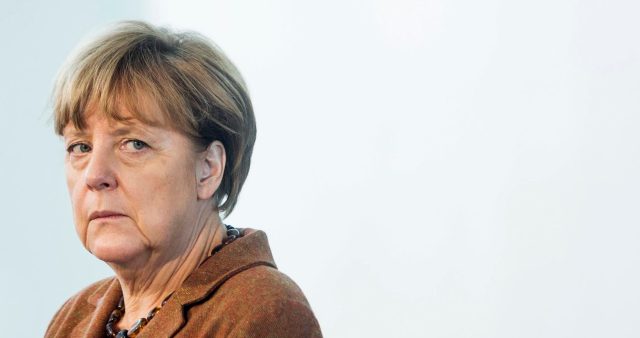Angela Merkel has been given credit for Germany’s response to the pandemic. Credit: Zick,Jochen-Pool / Getty

Who is the leader of the free world?
It’s not an official position, of course, but de facto it usually falls to the President of the United States – as the leader of by far the most powerful democracy. Though wielding no sovereign authority over America’s allies, when the President speaks, the rest of the world, and especially the rest of the West, listens.
There have been periods, however, when American leadership is compromised. This might be due to some infirmity of the President himself, as in the latter part of Ronald Reagan’s Presidency; or it could be due to serious disagreement over American foreign policy, as under George W Bush. Or, as is the case with Donald Trump, it could be that the President is unwilling to comport himself with the dignity befitting his position. His behaviour at the Armistice commemorations will have done little to salvage his reputation.
When a US President is unwilling or unable to take up the mantle of leadership, it sometimes settles on the shoulders of another country’s leader – someone whose heft and experience qualifies them as the pre-eminent statesman of the moment. For instance, in the late 1980s, when Reagan was ailing, but still in office, it was Margaret Thatcher who filled the role.
But who today can lead where Trump refuses to? Certainly not the second female Prime minister of the United Kingdom – who hasn’t been in Downing Street long enough and looks likely to be gone too soon. At one point, there were great hopes for Emmanuel Macron, but his position at home is crumbling – with ratings that make Theresa May look popular. As for his behaviour, I’m not sure that having a weird-off with Donald Trump is the best use of his time.
And so we turn to Germany and Angela Merkel. In office since 2005, there’s no doubting her experience – nor the status of her country as the driving force of the European Union. And then there’s her image. It is said that, in politics, women are judged more harshly on their appearance than their male counterparts, but that’s not always true. Donald Trump’s physical eccentricities are the subject of constant mockery, while Canada’s Justin Trudeau is belittled as a pretty boy Prime Minister. Merkel, however, is seen as embodying the deeper qualities that she – and, indeed, the entire German nation – seeks to project to the world: seriousness, stability, determination.
Until recently, that’s a narrative the world bought into – especially the liberal establishment in the UK and US, who look to Germany as the exemplar of grown-up politics. However, Merkel’s recent decision to step down as CDU leader and not to seek a fifth term as Chancellor provides an opportunity for reappraisal.
My own view, as I set out last year – is that Angela Merkel does not deserve her reputation. It seems I’m not alone. In an op-ed for Project Syndicate, Philippe Legrain delivers a damning verdict:
“Merkel’s 13 years in office have involved domestic drift and European decay. She has complacently coasted along, failing to address Germany’s mounting economic and security challenges, and allowing Europe’s many crises to fester. Her lethargic managerialism would be tolerable for a small country in quiet times; it is catastrophic for Europe’s dominant power in an era of upheaval.”
Legrain is no Eurosceptic headbanger – a glance at his impressive and very euro-establishment CV proves otherwise. He writes of “Trump demolishing the liberal international order” and of “swivel-eyed nationalists running amok” – however, he has no doubt that Merkel has helped to create the conditions in which populism has thrived:
“The eurozone crisis greatly enhanced Germany’s financial clout within the currency union. That gave Merkel massive political power, which she could have put to good use. Instead she put Germany’s narrow near-term interests as a creditor first, leading her to make decisions that exacerbated the eurozone crisis, shifted its costs to others, and prevented any long-term resolution.”
Nor does the destabilising impact of German policy stop at the borders of the Eurozone:
“Germany is not a trade cheat, as the Trump administration has claimed. And yet, under Merkel, it certainly has pursued a beggar-thy-neighbor mercantilist growth strategy that suppresses wages and boosts exports at all costs. Yes, protectionism is misguided; but mercantilism encourages it”
Of course, the Eurozone is what makes German mercantilism so effective – by suppressing the value of the currency that German exports are priced in. Still, Germany could have used its economic prowess – skillfully engineered in more ways than one – to make a larger contribution to, say, the defence of Europe. Instead, chronic under-investment in its armed forces means that Germany continues to rely on the Americans (with some useful contributions from the British and the French) for its protection. Another unsustainable state of affairs left to fester. Another failure of leadership.
Populist politicians like to present an unconventional image: sometimes tough, even brutal, like a Salvini or Le Pen; sometimes irreverent and subversive like a Farage or Grillo. What appalls the liberal establishment is precisely what delights the target audience, the embodiment of disruption. Of course, one can protest that the unspun image is itself a form of spin – a cynical manipulation that only the foolish or the desperate would believe.
But who’s really getting fooled here? Not the supporters of populist politicians – who are getting pretty much what they voted for.
I’m not sure that those of us who voted for responsible, far-sighted, selfless government have done nearly so well.










Join the discussion
Join like minded readers that support our journalism by becoming a paid subscriber
To join the discussion in the comments, become a paid subscriber.
Join like minded readers that support our journalism, read unlimited articles and enjoy other subscriber-only benefits.
Subscribe